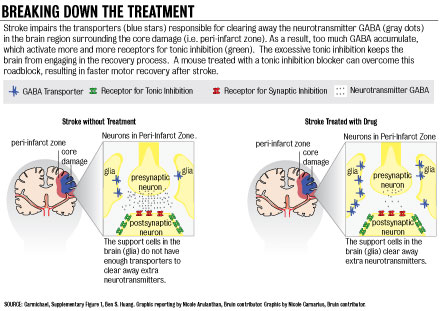Having suffered a stroke in April, Donna Voegeli’s only option for regaining mobility is physical therapy.
Because there are no drug treatments for stroke patients to regain mobility and brain functionality, this is the only way she can hope to recover full use of her body.
But a new UCLA study has targeted a possible medical treatment that could hasten the recovery of brain functionality. This would enable patients to regain more mobility than physical therapy alone could allow.
Ben Huang, a neuroscience doctoral student and co-author of the study, said the treatment could restore up to 50 percent more movement in patients than physical therapy.
“This is basically opening up a new way of treating strokes and promoting stroke recovery,” Huang said. “If our approach works and is confirmed by clinical trials, it will be a very promising drug and will help a lot of people.”
Huang said earlier studies have shown that when a stroke occurs, the blood vessels in the brain become blocked and cannot transport nutrients and oxygen to cells. The brain cells are unable to resume control over the body, which can lead to long-term disability.
“Right now, there’s basically no drug that can promote recovery,” Huang said. “There is only physical therapy to let the (area surrounding damaged brain cells) take over functionality.”
Huang said approximately 70 percent of stroke survivors in the U.S. have been physically compromised. Currently, doctors begin working with patients in physical therapy within a few days of the stroke.
“You do get discouraged. (Recovering from a stroke is) not the easiest process you’ve ever gone through in your life,” Voegeli said. “You basically have to do anything you can do to return to mobility and function on your own.”
The new research focused on the brain tissue that surrounds the stroke-damaged area but is itself undamaged by the stroke. Known as the peri-infarct zone, this region is crucial to post-stroke recovery, said Dr. Tom Carmichael, a member of the UCLA Stroke Center and co-author of the study.
Huang said after a stroke, neurons in the peri-infarct zone may become overexcited, which can create problems. To moderate this, the brain enacts a process called tonic inhibition, in which a neurotransmitter is released to inhibit over-excitability. As a consequence of this, neurons may be less able to control body movement.
The study found that tonic inhibition can persist long after a stroke and eventually hurt the brain’s ability to recover.
Previous studies on neurological stroke damage have not focused on tonic inhibition, and scientists have been unable to explain why recovery for stroke patients is such a slow process.
UCLA researchers are the first to study tonic inhibition. By observing the effects of this process in the brain, they determined the reason behind the slow recovery of stroke patients and then developed an appropriate treatment.
“We were wondering what is keeping (recovery of brain functionality) from happening sooner and better,” Huang said. “We found that too much tonic inhibition keeps the neurons from recovering sooner.”
But Huang said even if the treatment goes to human clinical trials, patients will still have to undergo physical therapy. The drug could shorten this process, but physical therapy is crucial to forcing the brain to resume control.
